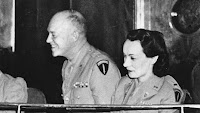Carolyn Mackler: The Earth, My Butt, and Other Big Round Things is told by a teen girl with a sassy nature, rather like in Georgia Nicholson's series. It's the kind of book that people think I'll be into–lots of people recommended Veronica Mars to me when it was on television–but I'm not much. I prefer narrators with a little more wryness and willingness to doubt their own doubts.
Patricia MacLachlan: MacLachlan wrote Sarah, Plain and Tall, which I read years ago. I read The Truth of Me this time. I’d forgotten how evocative her writing is. She tackles immensely deep topics in simple sentences–the result sounds practically like poetry. I found the book quite touching.
Bernard MacLaverty: Midwinter Break is about a believable, middle-age couple with troubles going on vacation. The beginning struck me as one of the better “true life family dysfunction” books I’ve encountered.
Alistair MacLean: The Guns of Navarone is a book I’d heard of (and confused with the movie Kelly’s Heroes. I review Kelly’s Heroes and The Dirty Dozen here). The book is one of those that catapults the reader directly into the middle of an operation run by tough and realistic-sounding soldiers. I've seen the movie since.
 Norman MacLean: “A River Runs Through It” is beautifully written.
Norman MacLean: “A River Runs Through It” is beautifully written.
Alison MacLeod: Tenderness is about D.H. Lawrence, the writer, and his book Lady Chatterley’s Lover, specifically the effort to publish it uncensored in the 1960s. I found the opening chapter about Lawrence interesting. I consider Lady Chatterley’s Lover only interesting BECAUSE it was censored and has a court case attached to it.
Ken Macleod: Learning the World is one of those sci-fi novels that keeps skipping between points of view. I suppose this technique is supposed to be insightful or different or profound or maybe just complex. I don’t know. It makes me tired in the same way that bad formatting makes me tired. The idea behind the book might be engaging but I have to suffer through never knowing who the book is about for several chapters? (Trying to find the next paragraph?) Eh, there’s other things to read.
Kathleen MacMahon: The Long, Hot Summer is yet another book about contemporary, dysfunctional family life. However, I became aware while reading the prologue, that these contemporary dysfunctional family life books seem to fall into two different categories. The first is what I call Misinterpreted Agatha Christie. Christie’s basic point is that even supposedly dramatic and scandalous life is utterly ordinary at its center. Writers who misunderstand Christie think that all ordinary life must be stripped away to reveal the dramatic scandal. They produce fairly awful movies of Christie's books.Along the same lines, books about contemporary family life either focus on the ordinary, no matter how unusual the family, or do what bad Christie movies do: keep burying the reader in drama and scandal.
The first I appreciate. The second makes me sigh, roll my eyes, and move on. The Long, Hot Summer appears to belong to the first category.




No comments:
Post a Comment